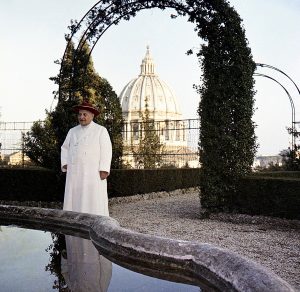John XXIII served as pope from 1958 to 1963 and was canonized April 27, 2014.
He is most noted for convoking the Second Vatican Ecumenical Council, which was inaugurated on Oct. 11, 1962, at St Peter’s Basilica.
But I best remember him for his promulgation of the Daily Decalogue.
- Only for today, I will seek to live the livelong day positively without wishing to solve the problems of my life all at once.
- Only for today, I will take the greatest care of my appearance: I will dress modestly; I will not raise my voice; I will be courteous in my behavior; I will not criticize anyone; I will not claim to improve or to discipline anyone except myself.
- Only for today, I will be happy in the certainty that I was created to be happy, not only in the other world but also in this one.
- Only for today, I will adapt to circumstances, without requiring all circumstances to be adapted to my own wishes.
- Only for today, I will devote 10 minutes of my time to some good reading, remembering that just as food is necessary to the life of the body, so good reading is necessary to the life of the soul.
- Only for today, I will do one good deed and not tell anyone about it.
- Only for today, I will do at least one thing I do not like doing; and if my feelings are hurt, I will make sure that no one notices.
- Only for today, I will make a plan for myself: I may not follow it to the letter, but I will make it. And I will be on guard against two evils: hastiness and indecision.
- Only for today, I will firmly believe, despite appearances, that the good Providence of God cares for me as no one else who exists in this world.
- Only for today, I will have no fears. In particular, I will not be afraid to enjoy what is beautiful and to believe in goodness. Indeed, for 12 hours I can certainly do what might cause me consternation were I to believe I had to do it all my life.
The Daily Decalogue serves well at any time and never more so, it turns out, than during a pandemic.

“Only for today, if my feelings are hurt, I will make sure that no one notices.”
Now that’s a tough one. Are you really going to praise her writing — to my face! — and not mine? Do you not realize I asked about a hundred questions about you during our conversation and you asked none about me?
“Only for today, I will devote 10 minutes of my time to some good reading.”
Thus, I’ve dusted off “Seven Short Novels by Chekhov,” returned to the “Letters of Caryll Houselander,” and just ordered three books on spiritual direction so I can be better prepared to help those who turn up on my doorstep.
That 10-minute rule works well for any number of things: balancing a checkbook, cleaning the bathroom, updating a website.
“Only for today, I will not criticize anyone; I will not claim to improve or to discipline anyone except myself.” Not even mentally. Just try it! Impossible!
To that end Father Augustine Wetta, a monk at St. Louis Abbey, recently posted a YouTube video on “obedience.”
Turns out that the one infraction St. Benedict could not abide — “ante omnia” (“above all others”) — was grumbling.
The word in Latin is “murmuratio,” which Father Wetta describes as “that cowardly, backstabbing, passive-aggressive, underhanded whining” — the kind of whining the Israelites did on their way out of Egypt when, after all the miracles God had performed on their behalf, they still carped about the food.
“Murmuratio” can also be defined as criticizing something you have no power to change, like oh, just say, the course of the coronavirus (COVID-19).
Grumbling poisons community life, undermines confidence, and is thus “incompatible with the monastic ideals.”
Father Wetta went on to describe what psychologists call “the fundamental attribution error”: I attribute my own actions to circumstance. I attribute other people’s actions to flaws in their character.
When I dash around the grocery store like a bull in a china shop, it’s because I don’t want to be late for Mass. When someone else does it, he or she is a selfish jerk. When I go on and on about myself, it’s because I’ve decided to allow myself to become vulnerable; to share. When someone else does it, he or she is a mindless narcissist.
For 12 hours I can do what would plunge me into despair if I thought I had to do it my whole life: Home-school my kids. Wear a mask. Watch and hear 24/7 predictions of catastrophe.
But wait. When someone else offers catastrophic predictions, they’re being a conspiracy theorist doomsdayer. When I share my reflections, I’m just trying to help.

